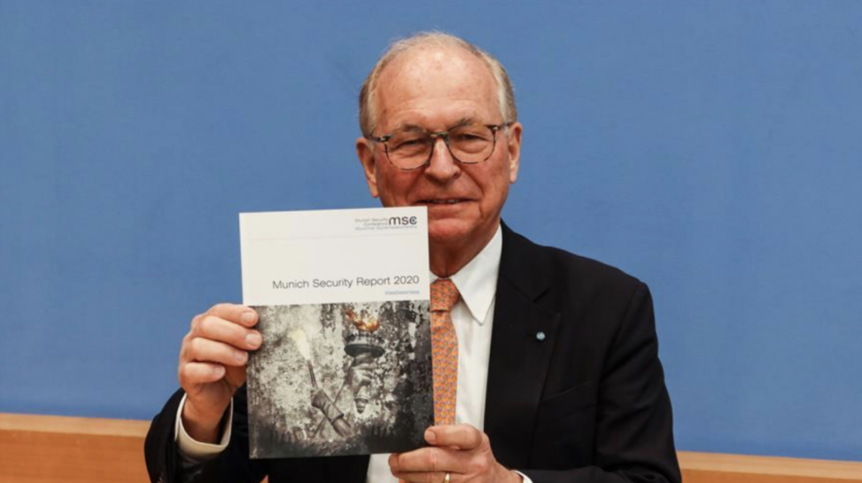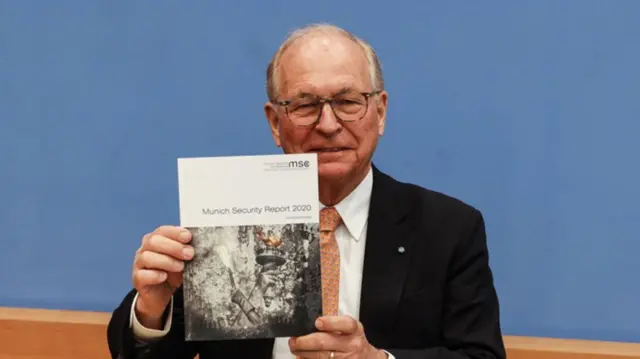00:51

This weekend, more than 500 international decision makers are gathering in Germany for the 56th Munich Security Conference (MSC). This year, they're focusing on the role that the West plays in today's world, and the unique challenges it now faces – from within and from outside.
On Monday, conference organizers released the Munich Security Report 2020 "Westlessness," which is also the theme of this year's event. According to the report, "Westlessness" suggests a world now shaped by the relative decline of the West, and relative rise of non-western countries.
"The term is new, but the concepts are really not," Richard Weitz, a Security Expert at the Wikistrat Global Consultancy, told CGTN Dialogue. He said it has been widely discussed for years that there's been a relative decline of the West in certain areas, such as economic dominance and the influence over some multinational institutions.
Regarding the cause of a "less western" world, Fraser Cameron, Director of the EU-Asia Centre believes that it's all about U.S. President Donald Trump. Trump is not a believer in alliances whether in Europe or Asia, and he sees foreign policy as purely transactional, which has led to the division of western countries. "He is the first American president ever to have actually described the European Union as a foe, we have to adjust that," Fraser said.
According to Fraser, there's never been so many disagreements between Washington and Brussels, such as the Nord Stream 2, Trump's Middle East peace plan, the issue of international trade, and the role of the World Trade Organization.
"This is not going to go away soon. These are pretty fundamental differences," Fraser said. "So, the question is how you manage these differences to ensure the preservation of the transatlantic alliance."
At the same time, within Europe, countries are struggling with leadership changes in Germany, and Brexit. Fraser thinks that we cannot expect anymore from Europe, and in terms of the hard security, Europe is far from giving more response.
In addition to the phenomenon of "Westlessness," Richard Weitz noted that the lack of a common position among the western countries may weaken the influence of the West. However, the replacements, or challengers, are also either divided, or hesitant to seize global influence commensurate with their economic strength.
Although there is much more discussion about China's rising as a potential challenge, Richard pointed out that China does not have the intention to challenge the western order, while Russia is more overtly challenging the West. Beyond that, he thinks India and Japan are both a bit more inward-focused, so the non-Western states are not a unified bloc yet.
What's also noteworthy is that global health security issue is also on the agenda of this year's MSC. China's State Councilor and Foreign Minister Wang Yi is attending the conference, and delivered a speech regarding China's efforts in fighting the novel coronavirus, and reaffirmed China's commitment to address global challenges with multilateralism and international cooperation.
Teng Jianqun, Director of the Department for American Studies at the China Institute of International Studies, stated that the Munich Security Conference provides a great opportunity for China to show its efforts on fighting the epidemic, and to reiterate China's commitment to defending multilateralism. He said it is a challenge for China and for the international community as well. Therefore, China needs to cooperate with other countries in a bid to conquer the novel coronavirus.
"Dialogue with Yang Rui" is a prime time English-language daily talk show on CGTN. The 30-minute program covers a wide range of domestic and international topics, providing a balanced and critical perspective on current affairs and analysis within the framework of cross-cultural and multi-disciplinary comparisons.
Schedule: Monday-Sunday
Time (GMT): 03:30, 11:30, 19:30
(If you want to contribute and have specific expertise, please contact us at [email protected].)
 简体中文
简体中文

